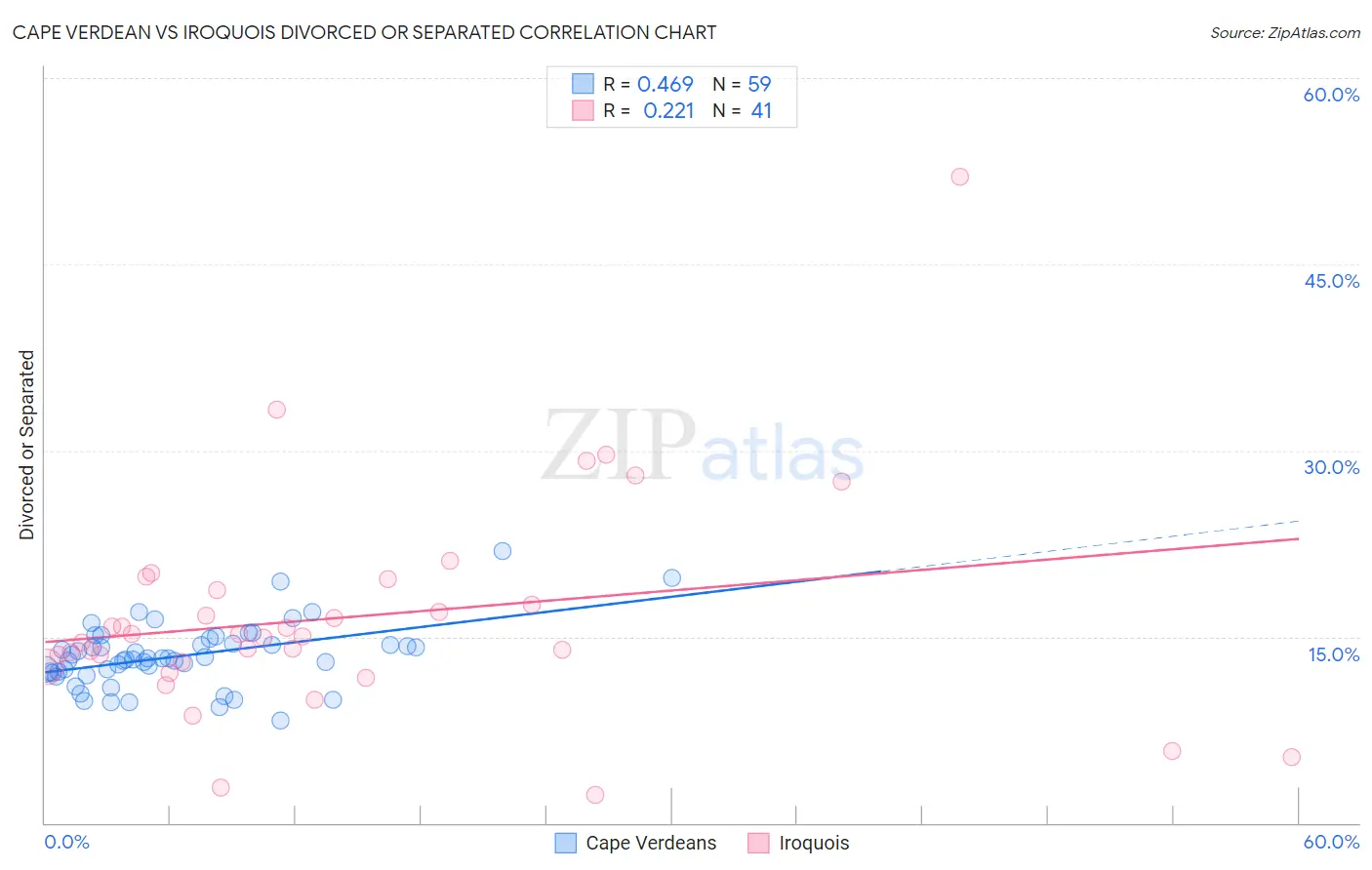Cape Verdean vs Iroquois Divorced or Separated
COMPARE
Cape Verdean
Iroquois
Divorced or Separated
Divorced or Separated Comparison
Cape Verdeans
Iroquois
13.1%
DIVORCED OR SEPARATED
0.0/ 100
METRIC RATING
303rd/ 347
METRIC RANK
12.9%
DIVORCED OR SEPARATED
0.0/ 100
METRIC RATING
289th/ 347
METRIC RANK
Cape Verdean vs Iroquois Divorced or Separated Correlation Chart
The statistical analysis conducted on geographies consisting of 107,557,736 people shows a moderate positive correlation between the proportion of Cape Verdeans and percentage of population currently divorced or separated in the United States with a correlation coefficient (R) of 0.469 and weighted average of 13.1%. Similarly, the statistical analysis conducted on geographies consisting of 207,262,032 people shows a weak positive correlation between the proportion of Iroquois and percentage of population currently divorced or separated in the United States with a correlation coefficient (R) of 0.221 and weighted average of 12.9%, a difference of 2.1%.

Divorced or Separated Correlation Summary
| Measurement | Cape Verdean | Iroquois |
| Minimum | 8.2% | 2.3% |
| Maximum | 21.9% | 52.0% |
| Range | 13.7% | 49.7% |
| Mean | 13.4% | 16.6% |
| Median | 13.3% | 15.0% |
| Interquartile 25% (IQ1) | 12.2% | 12.8% |
| Interquartile 75% (IQ3) | 14.4% | 19.2% |
| Interquartile Range (IQR) | 2.2% | 6.4% |
| Standard Deviation (Sample) | 2.6% | 8.8% |
| Standard Deviation (Population) | 2.5% | 8.7% |
Demographics Similar to Cape Verdeans and Iroquois by Divorced or Separated
In terms of divorced or separated, the demographic groups most similar to Cape Verdeans are Immigrants from Venezuela (13.1%, a difference of 0.020%), Alaskan Athabascan (13.1%, a difference of 0.12%), Hopi (13.2%, a difference of 0.13%), Chippewa (13.2%, a difference of 0.18%), and Immigrants from Cabo Verde (13.1%, a difference of 0.33%). Similarly, the demographic groups most similar to Iroquois are Pima (12.9%, a difference of 0.14%), French Canadian (12.8%, a difference of 0.15%), Immigrants from Honduras (12.9%, a difference of 0.26%), Scotch-Irish (12.9%, a difference of 0.32%), and Honduran (12.8%, a difference of 0.41%).
| Demographics | Rating | Rank | Divorced or Separated |
| Spanish | 0.1 /100 | #286 | Tragic 12.8% |
| Hondurans | 0.1 /100 | #287 | Tragic 12.8% |
| French Canadians | 0.1 /100 | #288 | Tragic 12.8% |
| Iroquois | 0.0 /100 | #289 | Tragic 12.9% |
| Pima | 0.0 /100 | #290 | Tragic 12.9% |
| Immigrants | Honduras | 0.0 /100 | #291 | Tragic 12.9% |
| Scotch-Irish | 0.0 /100 | #292 | Tragic 12.9% |
| Jamaicans | 0.0 /100 | #293 | Tragic 12.9% |
| Apache | 0.0 /100 | #294 | Tragic 12.9% |
| Celtics | 0.0 /100 | #295 | Tragic 13.0% |
| Nicaraguans | 0.0 /100 | #296 | Tragic 13.0% |
| Natives/Alaskans | 0.0 /100 | #297 | Tragic 13.0% |
| Venezuelans | 0.0 /100 | #298 | Tragic 13.0% |
| Immigrants | Jamaica | 0.0 /100 | #299 | Tragic 13.0% |
| Immigrants | Cabo Verde | 0.0 /100 | #300 | Tragic 13.1% |
| Alaskan Athabascans | 0.0 /100 | #301 | Tragic 13.1% |
| Immigrants | Venezuela | 0.0 /100 | #302 | Tragic 13.1% |
| Cape Verdeans | 0.0 /100 | #303 | Tragic 13.1% |
| Hopi | 0.0 /100 | #304 | Tragic 13.2% |
| Chippewa | 0.0 /100 | #305 | Tragic 13.2% |
| Tlingit-Haida | 0.0 /100 | #306 | Tragic 13.2% |